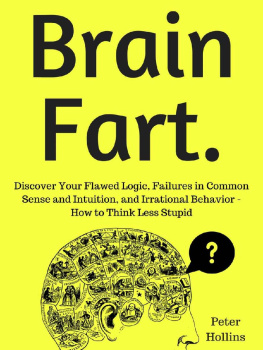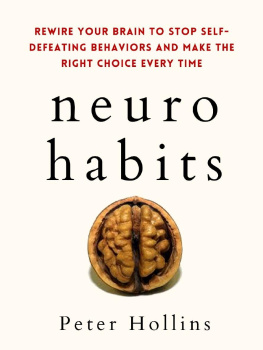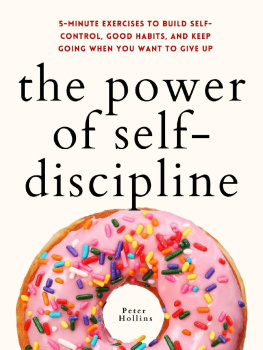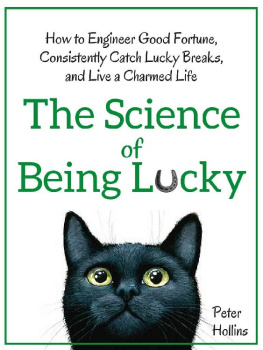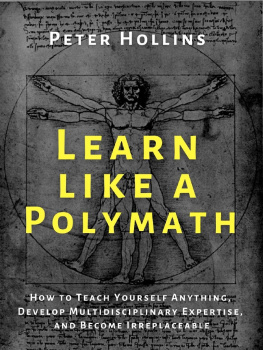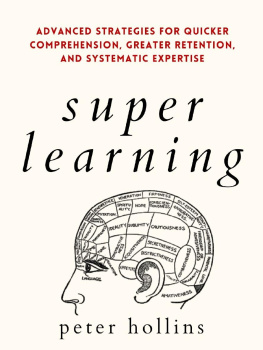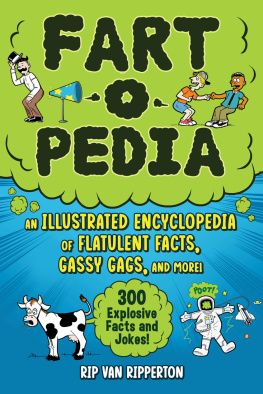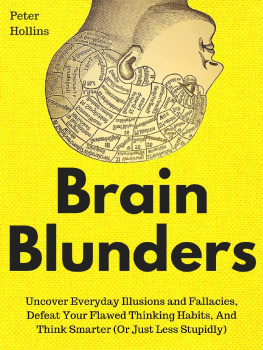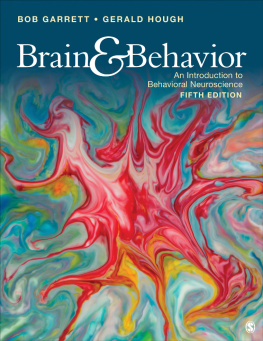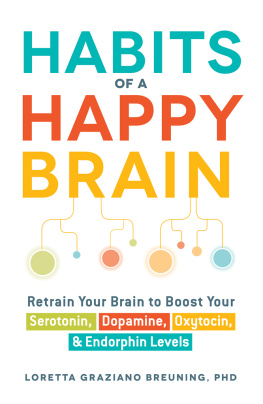Brain Fart.
Discover Your Flawed Logic, Failures in Common Sense and Intuition, and Irrational Behavior -
How to Think Less Stupid
By Peter Hollins,
Author and Researcher at petehollins.com
Click for your FREE Human Nature Cheat Sheet: 7 Surprising Psychology Studies That Will Change The Way You Think
Table of Contents
Brain Fart. Discover Your Flawed Logic, Failures in Common Sense and Intuition, and Irrational Behavior - How to Think Less Stupid
Introduction
Introduction
When I was a teenager, I remember going with my parents to buy a new car.
The car certainly wasnt for me, no matter how much I begged and pleaded with the might of my new drivers license. The car was for my mother; she had gotten into a minor accident, which our insurance company had deemed major enough to cover the cost for a new car. It was the one of the few positive interactions I would ever have with insurance companies.
I distinctly remember this day because I remember the salesperson that we dealt with or rather, tolerated . He was the stereotype for a slimy salesman who would pat your back and keep repeating your name in an annoying fashion. If you could create an untrustworthy salesperson in a lab, you would come up with this man.
Things went quickly because my parents were in a buying mode and it showed plainly on their faces. They were busy people and just wanted to get in, get the car, and get out. This type of sentiment is like blood in the water for salespeople.
The negotiations went quickly and I noted that the salesman didnt bring up the price until as late in the process as possible. Every time my father tried to clarify, he would say something like, Right, well get to that right after this, I promise. Just a couple more things to hammer out.
He was drawing my parents deeper and deeper into the process, and when he finally presented the price with all the amenities my parents wanted (power windows, air conditioning, a CD player), he presented a figure that made my parents gasp. In particular, my father looked shell-shocked, like he had just witnessed a robbery in the street.
In hindsight, he had anchored the price exceedingly high so as to reduce the amount of wiggle room my parents had. In other words, because the quoted price was high, it was innately assumed that you couldnt work too far down from it even if you wanted to, three-quarters of the price was still extremely high.
Little did he know my parents were raised in a culture where you were mocked if you didnt try to get a good deal on anything you purchased. They had grown up going to small markets, and haggling was second nature to them.
Once my parents set their own anchor to a far lower price, the salesman began to squawk about how the decision had to be made quickly within the hour because his supervisor had imposed some quota on him, and the cars were selling at a fast pace. I remember my father standing up, walking outside the salesmans office, and looking around theatrically. When he returned, he said, There is only one other potential customer here, and he is looking at a different car.
In what appeared to be the salesmans final argument to seal the deal at a higher price, he tried to get me on his side by appealing to my sense of desperation of wanting to drive. He said things like, Kid, if your father doesnt pull the trigger, you cant hang out with your friends! Little did he know I had a strict curfew and could never hang out with my friends regardless. He had tried to make an ally out of me, but I already disliked him, so I would never have agreed with him.
In the end, my parents walked out with the car they wanted at the price they wanted. This battle of wills was forever emblazoned in my brain as an example of when people tried to make an independent decision, only to be boggled using covert manipulation and fallacies in human reasoning designed to generate a specific outcome. The salesman was trying to pull one over our eyes and make us Brain Fart have a momentary lapse in our collective judgment.
Humans make poor decisions and exhibit seriously flawed thinking on a daily basis. Our brains try so hard to make sense of the world that it actually works against them. Combine that with emotional thinking and a tendency to jump to conclusions and what do you get?
A profoundly flawed brain which makes suboptimal decisions. Frequent flaws and farts in logic and reasoning.
In Brain Fart , I want to shine a flashlight into the depths of our brains and expose why we do what we do in such peculiar ways. We think we are driven by logic and reason, but it appears that common sense isnt really as common as wed like to think.
That car ended up being passed down to me years later, and I found it profoundly funny that my parents had left the price sticker on the interior top of the front windshield as a reminder of their triumph that day.
Heres to uncovering the hidden ways we act against our best interests.
Chapter 1. Free Will (Or Lack Thereof)
Theres not a person alive who prefers to think of themselves as a follower. We all like to imagine that we have free will and are actively making our decisions instead of the other way around.
In fact, we view followers with a negative slant. These are the people who are easily influenced by others and can even be manipulated into doing things theyre either unaware of, or uninterested in. Whatever the case, followers are not people that are seen in an attractive light.
On the other hand are leaders. Leaders are what we typically want to aspire to, and for good reason. They are prominent, and it is usually a positive and valuable descriptor for someone. If you want to compliment someone in a work setting, you would call them a leader, and if you want to insult someone, you would call them a follower.
Leaders blaze the trail and set the path instead of the other way around. They are strong-minded and are driven by a set of morals and convictions. Above all else, they do what they want because they want it, not because someone has told them to do it.
So we all want to be leaders on some level, but the truth of how we all act is a bit uglier. What we might define as free will on a daily basis is actually just us being influenced in subtle and subconscious manners by other people and the settings we find ourselves in.
Heres a simple example.
If you walk into your new job and you find everyone wearing magenta shirts, you are probably going to find a magenta shirt as soon as you can for the next day, despite the fact that there is no dress code and no one has ever mentioned anything about magenta shirts. Something in your mind will tell you that you should be conforming to the people around you, even though there are no rules about it and the people youve asked havent mentioned it, either.
We are heavily influenced by the people around us and the contexts we find ourselves in, to such a degree that free will is more accurately categorized as just another decision that depends on what we see and feel from others.
In this chapter, I want to cover three infamous, landmark studies that show just how little our actions are determined by free will, and instead are decided by context, pressure, or outright instruction to act in ways that are highly contrary to our identities or preferences. These studies shed light on why we feel compelled to wear a magenta shirt even if there is no dress code, and why people tend to act against their own interests or values.
The Asch Conformity Experiment
The first study that digs deep into the concept of dubious free will is the Asch Conformity Experiment.
This study was conducted by Solomon Asch of Swarthmore College in the 1950s and broadly demonstrated the compulsion to conform and fit in despite our best instincts and interests.
Next page
